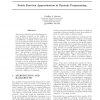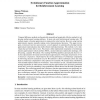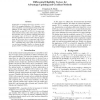162 search results - page 7 / 33 » Off-Policy Temporal Difference Learning with Function Approx... |
120
Voted
ICML
1995
IEEE
16 years 3 months ago
1995
IEEE
The success ofreinforcement learninginpractical problems depends on the ability to combine function approximation with temporal di erence methods such as value iteration. Experime...
136
Voted
NIPS
2008
15 years 4 months ago
2008
In this paper we consider approximate policy-iteration-based reinforcement learning algorithms. In order to implement a flexible function approximation scheme we propose the use o...
133
Voted
CORR
2010
Springer
15 years 2 months ago
2010
Springer
Temporal difference methods are theoretically grounded and empirically effective methods for addressing reinforcement learning problems. In most real-world reinforcement learning ...
131
Voted
AAAI
2011
14 years 2 months ago
2011
In this paper we propose differential eligibility vectors (DEV) for temporal-difference (TD) learning, a new class of eligibility vectors designed to bring out the contribution of...
130
Voted
ICML
2007
IEEE
16 years 3 months ago
2007
IEEE
Reinforcement learning algorithms can become unstable when combined with linear function approximation. Algorithms that minimize the mean-square Bellman error are guaranteed to co...



